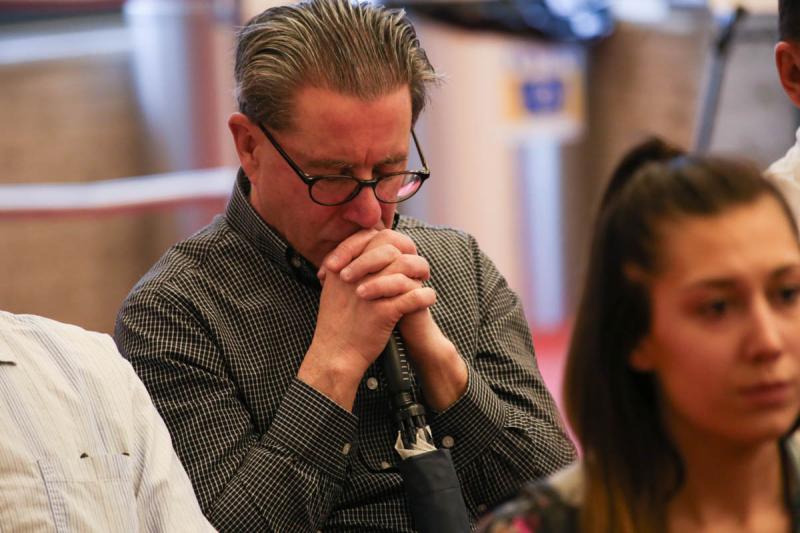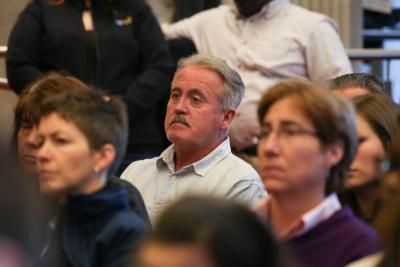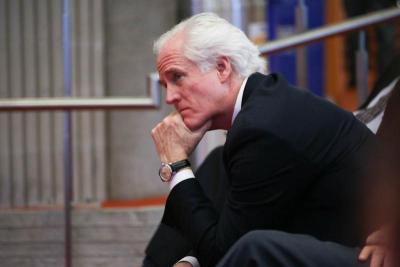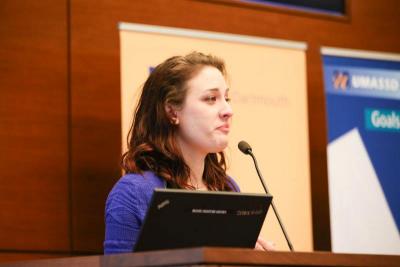Dartmouth community stands together against opioid addiction
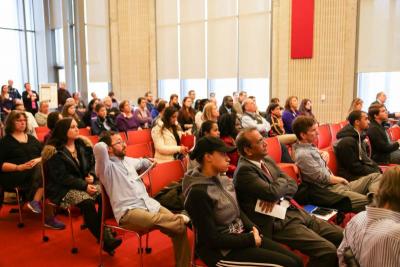

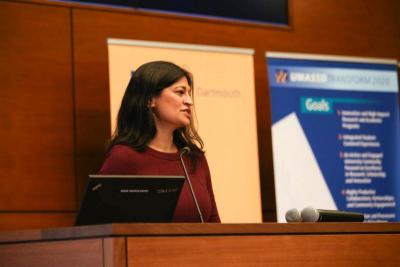
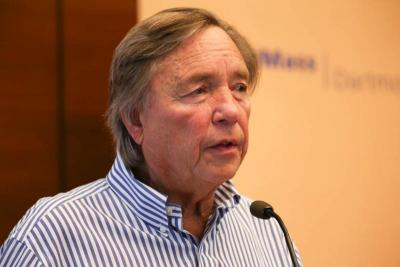
The only guarantees in life for a drug addict are “an early death, and a life filled with guilt and misery and sadness and loneliness,” said Ralph Gear tearfully to an assembly at UMass Dartmouth.
Gear, the father of Colin Gear, the 20-year-old UMass Dartmouth student from Stoneham who died of a suspected heroin overdose on Jan. 29, gave a frank, somber warning to the campus community of the realities of drug addiction during the forum on Tuesday, Feb. 16.
The Corsairs Care: Facing Addiction forum brought together members of the community to discuss issues of opioid addiction. The event was held in the wake of Colin’s death. Just two days after his apparent overdose, another student suffered an overdose but survived after a friend called 911.
“Colin dropped dead alone in his dorm room, and that’s as good as it’s going to get if you play with this poison,” he continued. “We read about drug addicts every day. What we don’t read about is the abject misery of an addict. What we don’t think about are the 20 year olds that have strokes as a result of this poison, or in nursing homes, fully aware that their diapers are being changed. You don’t read about that.”
There was no applause following Gear’s speech, just silence as the audience reflected on the bereaved father's words.
Overdose deaths in the region have risen 300 percent. In 2014, there were 1,400 overdose deaths in Massachusetts, according to “Heroin: Cape Cod, USA” director Steven Okazaki.
“In this area alone, in one city, there were five overdoses in one day,” said Col. Emil Fiorvanti.
Heroin addiction is now so commonplace on the South Coast that Narcan, a medication that blocks the effects of opioids and reverses an overdose, is now regularly carried by emergency responders and police.
“A second student cheated death only because a friend called for help,” said Associate Vice Chair of Student Affairs Cynthia Cummings. “For the past few years, everyone who has entered UMass Dartmouth as a first year student has been exposed to the concept of bystander intervention.”
Bystander intervention is the interruption of a potentially harmful situation by an outside party.
“It is saying to someone else that while I'm around you, I will do what I can to protect you from harm,” Cummings said.
Despite tragic stories and statistics of the staggering rates of heroin addiction, the ultimate message was one of hope: you’re not alone.
When attendees whose lives were touched by drug addiction, whether their own or that of a loved one, were asked to stand, nearly half of the packed room rose.
Several attendees shared stories of how the disease of addiction had touched their own lives. Whether they had loved ones who were addicts or addicts themselves, a common thread was present between the speakers: addiction burdens everyone close to the addict.
For many, the wounds left from addiction are still raw.
“My brother has died four times, and come back,” a male UMass student said of his older brother who had repeatedly received Narcan. “Every day, I feel like is a fight for my sanity. I wake up and my mind is on anything but what’s in front of me.
“Last May, my brother actually died from an overdose,” a female UMass student said. “He had been ten months sober when he relapsed and died of an overdose.”
Some shared their success stories, too.
“The only way that I survived so I could have this conversation with you today is that 37 years ago, I walked into the church of Al-Anon,” a man shared. Raised in Ireland, he was surrounded by uncles whose addictions made them into “different people” who beat their wives.
“I learned that [addiction] is a disease. I owe it to those women at Al-Anon who made me take the cotton out of my ears, put it in my mouth and listen when they said I was worthwhile, and this addiction can not take me,” he continued.
One student said the biggest obstacle to overcoming addiction is stigma. For many addicts, the stigma of criminality surrounding drug addiction leads to shame and embarrassment, which discourages people from reaching out when they need help.
"[My brother] was ashamed of being an addict and he didn't want to get help," the female student added.
People at risk may not reach out for help because they fear consequences of using drugs. However, according to Massachusetts General Law, Section 34A of the Controlled Substances Act states “A person who experiences a drug-related overdose and is in need of medical assistance and, in good faith, seeks such medical assistance, or is the subject of such a good faith request for medical assistance, shall not be charged or prosecuted for possession of a controlled substance.”
Additionally, UMass has a similar Medical Amnesty Policy in which neither the user or the witness will face disciplinary action for calling for help in the event of a drug-related incident.
UMass has plans to continue the conversation about combating opioid addiction with the development of a peer support network and Narcan Opioid Overdose Prevention Training. There will be screenings of “Heroin: Cape Cod, USA,” a documentary about the follows eight young addicts, and “The Anonymous People,” a documentary about the 23 million Americans living in long-term recovery.
If you or someone you love has a substance addiction, you can reach out to Positive Action Against Chemical Addiction at 508-997-9051; Gosnold on Cape Cod at 800-444-1554; Seven Hills Behavioral Health at 508-996-3147; AdCare Hospital at 800-252-6465; Director of Public Health Christopher Michaud; or Youth Advocate Jennifer Cabral at 508-910-1855 or 508-951-9551.



